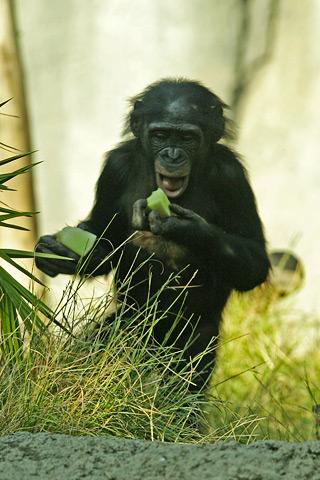Bonobos can communicate in the same way as human babies - by using sounds that derive their meaning from context.
Many animals, especially primates, can communicate with each other by using a sound with a particular meaning, for example one sound for "danger" and a different one for "food". However, it had been thought that only humans could communicate using sounds whose meanings differ depending on context alone.
Bonobos use a high pitched call, or "peep", on many occasions. "They peep a lot during feeding, and food discovery, when they are grooming, and when they are preparing their nests at night. They peep when they are about to start travelling or when they stop travelling, and they peep during play and aggression and even during sex", says Dr Zanna Clay, from the University of Birmingham, who led the study.
Clay followed a group of wild bonobos in the rainforests of the equatorial congo to study these peeps in more detail. By using recording equipment to analyse the acoustic signal, Clay determined that this was the same sound, but in different contexts.
This is where the similarity with human babies arises. These same calls - termed "protophones" - were made by the bonobos in both positive and neutral circumstances, and were separated from the monkeys' emotional states. This differs to calls related to emotion, such as crying or laughter in humans, and the calls of most other animals which are not dependent on context.
By comparison, peeps made in situations where the bonobos experienced negative emotions differed to those in neutral or positive situations, and were more fixed in their meaning. This is more typical of other animals and primates.
Human babies are able to produce these types of sounds, which are building blocks of speech, even as young as 4 months and certainly before they can talk. This has been argued as a uniquely human characteristic.
"Although speech is unique to humans, the building blocks of speech were probably already present before we became human, and actually our close relatives, the bonobos, show an ability that is essential for speech to develop," says Clay. This makes us humans less unique than we thought.
This finding provides an insight into the origin of language itself, and gives a clue as to the evolutionary shift from vocalisations specific to a context or emotion, towards the more flexible vocalisations of humans.










Comments
Add a comment